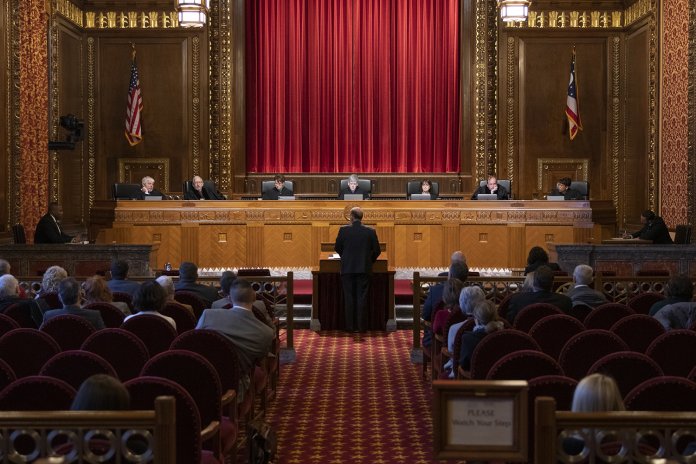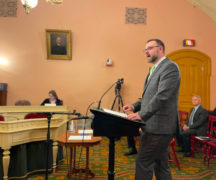By Susan Tebben
The Ohio Supreme Court said a city is not considered a victim under a law that would give restitution to crime victims.
The city of Centerville tried to recoup $1,375 in payroll losses after a false active shooter report was filed by a resident in 2018.
Michael Knab reported a shooter to Centerville Police Department, and police and fire department units responded.
No shooter was found at the residence, and the man was charged with misdemeanor counts of making a false report to law enforcement and improper use of the 911 emergency system. His sentence included restitution, but Knab argued the city was not due restitution, because they didn’t suffer economic loss.
The city argued Marsy’s Law, which took effect a few months before Knab called police, expanded the definition of “victim” to include municipalities.
“Just like any other ‘person,’ whether that ‘person’ is a natural person, a partnership, or a private corporation, a criminal offense can be committed against a municipality and a municipality can be directly and proximately harmed by such an act,” attorneys representing Centerville wrote in a brief to the Supreme Court.
Marsy’s Law was approved as a constitutional amendment in Ohio as part of a national movement started in 1983 in California, when Marsy Nicholas was killed by her ex-boyfriend. Nicholas’ family was not notified when her convicted killer was released from jail on bail, because of the absence of a law requiring communication with family.
In Ohio, the amendment was meant to give families and crime victims “constitutional rights that are equal to the rights of individuals accused of committing crimes,” the Ohio Supreme Court opinion stated.
The Second District Court of Appeals upheld Knab’s conviction, but agreed with Knab that restitution was not appropriate under the victim’s rights law.
Supreme Court Justice Judith French noted in the court’s opinion that “person” is not defined in the law, nor does the law specify types of harm that qualify for restitution.
The state’s highest court examined Marsy’s Law as a voter would have when approving the constitutional amendment, and decided “nothing in the text of Marsy’s Law suggests that the voters intended that a municipal corporation could qualify as a victim under that section.”
“Although a municipal corporation has some rights and duties that are similar to individuals and private corporations, it is often treated differently than such persons,” the court stated in its ruling.
While the Supreme Court said municipalities don’t qualify for restitution under Marsy’s Law, they noted that one could qualify under other compensation laws.
There are two pieces of legislation are looking to expand the definitions of victims in Ohio crime reparations law, although municipalities might still struggle to meet those definitions.
On the House side, state Rep. Bob Cupp, now House Speaker, introduced the Ohio Crime Victims Bill of Rights in House Bill 610 back in April. The bill was created to implement the rights in Marsy’s Law.
Provisions of the bill require a “Marsy’s Card” to be provided to victims “at the earliest contact with law enforcement,” protect victim privacy and notify crime victims of accused perpetrators’ release from prison.
“The main goals of HB 610 are to ensure that crime victims are able to understand, exercise and enforce the rights accorded to them by the Ohio Constitution, and to fill in some of the details to assist law enforcement officials and the courts in applying the rights of crime victims in criminal justice proceedings,” Cupp said in a statement about the bill.
Sen. Peggy Lehner, R-Kettering, renewed an effort she made two years ago to “update the law to increase accessibility to this program, and increase the amount that certain victims can receive,” she said in September introductory testimony before the Senate Judiciary Committee.
In response to the 2019 Oregon District shooting in Dayton, she and cosponsor Sen. Nathan Manning, R-North Ridgeville, set out to expand the definition of a victim to include family members who witnessed a crime or arrived at the crime scene “in the immediate aftermath.”
Their bill would also include family members who are caretakes of victims of sexual assault, who are their dependents. Eligible victims would receive up to $15,000 for wages lost due to treatment and counseling.
Both bills had hearings scheduled on Tuesday, but saw no testimony or votes.





